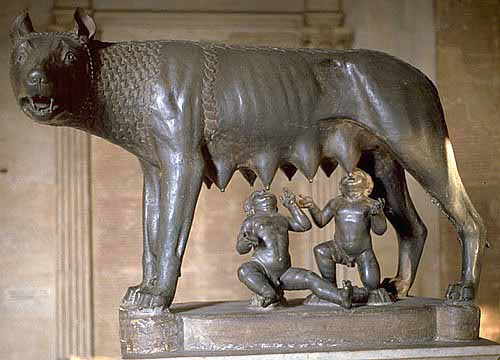THE AENEID
To make a very, VERY long story very, VERY short, the Aeneid is the mythical story of Aeneas, a Trojan who escaped the fall of Troy, bounced around the Mediterranean with a group of other Trojan refugees, and ultimately took over a little slice of land in Italy, which would eventually become the site of Rome. The Aeneid was written by Vergil, who composed the story between 29 and 19 BC, but the actual story is supposed to take place over 1000 years earlier (no specific dates are given in the story, but scholars put the possible fall of Troy at around 1194-1184 BC), meaning this was a mythical story of ancient history even at the time it was written.
Is the story true? Probably not most of it. Scholars disagree over whether there even was a Trojan War, or whether Troy fell, or whether the whole thing was just a Greek legend, so the story of a survivor of that potentially-nonexistent war is even more doubtful. But the fact that both the historian Dionysus of Halicarnassus and the poet Vergil have recorded this story mean it's the best we've got to go on. Romulus and Remus are supposedly Aeneas' distant descendants, although we can't be sure they even really existed, either. So, in terms of history, take this with a grain of salt; just know that, according to legend, the Trojan Aeneas took over land in Italy, on which his supposed descendants Romulus and Remus eventually founded the city of Rome.
Is the story true? Probably not most of it. Scholars disagree over whether there even was a Trojan War, or whether Troy fell, or whether the whole thing was just a Greek legend, so the story of a survivor of that potentially-nonexistent war is even more doubtful. But the fact that both the historian Dionysus of Halicarnassus and the poet Vergil have recorded this story mean it's the best we've got to go on. Romulus and Remus are supposedly Aeneas' distant descendants, although we can't be sure they even really existed, either. So, in terms of history, take this with a grain of salt; just know that, according to legend, the Trojan Aeneas took over land in Italy, on which his supposed descendants Romulus and Remus eventually founded the city of Rome.
ROMULUS AND REMUS
|
Like Aeneas, much of the information we have regarding Romulus and Remus is couched in legend and mythology, so it probably isn't 100% true. However, their story does seem to be a bit more factual and evidence-based than Aeneas' story, so we can believe at least parts of it more readily.
According to legend, Rhea Silvia was the daughter of Numitor, king of Alba Longa (a city-state near the area that would become Rome). The god Mars came down and impregnated Rhea Silvia, and she bore twin sons, whom she named Romulus and Remus. However, Rhea Silvia's evil uncle Amulius, having taken over the throne from his brother, left the twins to die in the Tiber river. They survived, and by the miraculous intervention of the gods, they were raised by the local wildlife (which is why the most famous art depicting Romulus and Remus shows them suckling milk from a she-wolf). |
|
|
Romulus and Remus grew up in an area called Latium, populated by the Latins (which is where the Latin language gets its name). As they grew up, they met some of the local people and actually became respected leaders within the local communities. When they found out their true heritage and story, they returned to Alba Longa, killed Amulius, reinstated Numitor as king, and then decided to go found their own city.
The twins disagreed hotly on where to put the city. Romulus wanted to build it on the Palatine Hill, whereas Remus wanted it on the Aventine Hill. Their disagreement led to a fight, at which point Romulus killed Remus and planted the city on the Palatine. He named it Roma after himself, and thus the Eternal City was born. |

